Beecham’s Triumph In Absentia
by Charles A. Hooey
In the summer of 1910, music lovers in London were all agog thanks to goings-on at His Majesty’s Theatre. Everyone was being urged to attend a show by that upstart from St. Helens, Tommy Beecham. It was said, “In Paris, he saw a production at the Opera-Comique and now he’s brought the concept here. I’ve tickets for operas by the Strausses: Richard’s Feuersnot and Die Fledermaus by Johann. Now, how often would you find fare like this at the Royal Opera?”
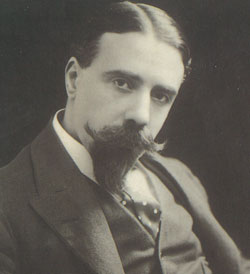
Beecham’s formula was simple. Present light opera with attractive love stories framed by music of eminently tuneful and graceful nature, spiced with romance and humour, and patrons would be bound to come. A plus were his artists. As he explained in The Musical Standard, “The summer season was throughout an English season with all-English artists and chorus, with the exception, I think of two members…I have maintained from the beginning, and I maintain still, that the day has long gone by for talking of British artists in a semi-apologetic tone because they happen to be British-born..I contend that there are in the United Kingdom a great number of men and women who possess remarkable talent…”
He began his Opera-Comique experiment on 12th May with Offenbach’s Les Contes d’Hoffmann in the sparkling English of Edward Agate. It became an instant hit. Then came Stanford’s Shamus O’Brien, Feuersnot, Mozart’s Impresario and so on, every one truly delightful creations. Not all paid their way, however, and when costs did soar, the maestro simply delved into his family coffers. As long as the public bought Beecham’s pills, opera flourished.
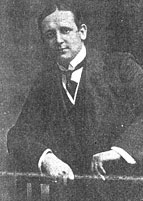
Amongst his singers was a lovely lyric soprano from Portsmouth and, as will be seen, this tale could easily have been labeled Caroline Hatchard’s Triumph, and a fine, strapping tenor in John Bardsley (right). They studied at the Royal Academy of Music, and in July, 1903, both were recognized for excellence, Caroline receiving the Melba Prize for sopranos and John the Maas Memorial Prize.
After the summer’s huge success, Beecham resolved to mount a swing through the provinces. To solve the huge logistics problems, he chose to present his “tuneful lightweights,” (as he called them) Hoffmann and Fledermaus, the latter as “A Viennese Masquerade” then The Bat, until eventually it was dropped altogether. Six evenings and one or two matinees were meted out weekly in thirteen cities that autumn with fourteen more added after Christmas. His company was nearly one hundred strong, including an orchestra of thirty.
Although it was his first operatic tour, Beecham would make just a single appearance. He had a busy schedule at Covent Garden and elsewhere so he asked Thomas Quinlan to manage the operation. Initially Hamish MacCunn conducted both operas, but to ease the load, Howard Carr, an aspiring composer who wielded a baton to survive, was engaged to assist. He soon relieved MacCunn of Fledermaus.
Why was this project so special? After all, other opera companies had toured for years. None, however, it is certain, had ever delivered music with such precision and so full of unparalleled opulence. As well, often one or both operas were heard for the first time in the cities visited.
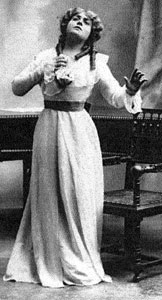
It began on 5th September 1910. “This tour has been awaited expectantly by all opera lovers throughout the country, and Blackpool audiences receive the first visit.” The Gazette News noted, “The difficult role of the doll in The Tales of Hoffmann, is taken by Miss Caroline Hatchard (left), an operatic soprano who is fast winning fame, and who has sung in important roles in Grand Opera at Covent Garden as well as in the Beecham operas. Miss Hatchard began as a concert singer at the age of sixteen, but her success in opera has been so great that she has now by all intents abandoned the concert platform. The range of her voice is very exceptional for a soprano, being from low G to D in alt, with sustained passages of great beauty in each portion of the compass.”
Holidayers were in the majority at Her Majesty’s Opera House, everyone being drawn by the Beecham magic. MacCunn stepped up to conduct The Tales of Hoffmann with a cast that resembled that seen in London:
Hoffmann – John Bardsley
Giulietta – Edith Evans
Nicklausse – Ruby Gray
Antonia – Beatrice La Palme
Dr. Mirakel – Charles Magrath
Crespel – Frederick Ranalow
Coppelius – Charles Magrath
Spalanzani – M. R. Morand
Dapertutto – W. J. Samuell
Schlemil – Cecil Pearson
Olympia – Caroline Hatchard
3 Servants – H. Scott Russell
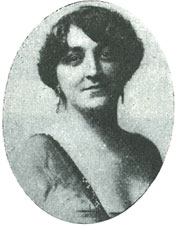
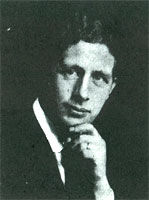
The next day, The Herald And Fylde Advertiser was quick to praise. “John Bardsley made a splendid Hoffmann now the merry roisterer and now the passionate lover…Beatrice La Palme’s portrayal of the tragic Antonia was a striking performance.. Caroline Hatchard’s presentation of Olympia, the automaton, was the essence of daintiness, and her ‘Song of the Heart’ was enthusiastically encored. It was a song of trills and cadenzas, light and blithesome, and it showed off a sweet voice to perfection. Her stiff doll-like movements were remarkably realistic … Edith Evans’s Giulietta (left) is played with an appropriate abandon and passion, and her singing is quite what one expected from such a gifted artist. William Samuell (right) possessed a gorgeous high baritone that he used with exceptional skill, more than usual in such a youthful artist.” His singing of Dapertutto gave him the role for the duration. And “H. Scott Russell, in a difficult triple role, supported the comedy element very ably without the least suggestion of overacting.”
The next evening Die Fledermaus took to the boards with much the same crew and again MacCunn was at the helm.
Eisenstein – John Bardsley
Orlofsky – Ruby Gray
Rosalinde – Caroline Hatchard
Alfred – Alfred Heather
Dr. Falke – Frederick Ranalow
Blind – H. Scott Russell
Frank – M. R. Morand
Ivan – Cecil Pearson
Adele – Beatrice La Palme
Frosch – Montague Alliston
Molly – Gladys Ancrum
“Strauss’s intensely diverting comic opera Die Fledermaus,” said The Herald, “afforded three hours’ ceaseless amusement and enjoyment to a large and enthusiastic audience. The music throughout is charming, full of captivating melodies, and the fun is most infectious. As an entertainment for a seaside holiday crowd, it is one of the best.”
In Belfast on 12th September, press coverage was immense. They saw “a ray of hope for those who love the art so well… provided by Mr. Thomas Beecham who, quite recently, has pluckily taken up the task of popularizing good comic opera and musical plays.” The Northern Whig: “Mr. Beecham has not set himself to excel in production or to present the most advanced modern work, so much as to reveal the beauties of comparatively little-known masterpieces…he introduces to Belfast for the first time The Tales of Hoffmann, which was presented with signal success last night.”
Of Caroline in her very exacting part, “both as regards singing and acting as the doll, Olympia, her personification was all that could be desired. Her voice is of a delicious, rounded quality, and though the range required for the part was of astonishing greatness, she never seemed to strain in the slightest. The spasmodic automatic motions of the doll were splendidly done.” To The News-Letter “The part of Olympia is one which calls for talent of a high order, because of the restraint which is imposed on the artist, who has to do her best to convince the audience, as well as Hoffmann, that she is nothing more than a mere piece of mechanism created by the wily old Spalanzani. Miss Caroline Hatchard, who filled the role, has a voice which is remarkable for its purity and evenness. She has a marvelous register, but even more important is the flexibility of the voice and the effective manner in which she uses it to give meaning and vitality to the words she sings.”
To The Evening Telegraph, she was “a most clever and delightful doll. Her lovely voice had the right impersonal, colourless quality – all of a piece with the mechanism that would run down and the oil-can that lubricated the stiff joints – such pretty joints too. The facial immobility and fixed stare of the eyes were well kept up. All the unreal reality of the part was there. Her song was encored and the easy, fluent vocalism fully deserved that.”
“Nothing could have been more perfect than Miss Caroline Hatchard’s Olympia”, raved The Mail, “she was, as one might say on this side of the water, the doll to the life. Her frizzy bright hair, her wide staring blue eyes, her waxen arms, and expressiveless face gave extraordinary effect to this unusual and fascinating part. It would be no compliment to say that Miss Hatchard sang with expression, for she did not. She is too fine an artiste to give expression in music which is intended to be machine-made. Her vocalism, however, was beautifully clear, and her pronunciation splendid.”
After a week in Dublin, the Company on 26th September began a two week stay at the Kennington Theatre in south-east London. What happened is anyone’s guess as this theatre was destroyed in World War II and its records obliterated or dispersed. When the Company departed, notably absent was Miss La Palme, Beecham having taken her back to the Garden.
They rolled into Manchester on 10th October to face The Guardian’s Samuel Langford, feared scion of musical scribes in the North-West. Perhaps hearing Miss Hatchard for the first time, he wrote, “Miss Caroline Hatchard, as the mechanical doll, gave away many points of good singing to preserve the illusion of mechanism, (and) sang in a delightful way. We do not know just how many times her famous song was encored, but the oftener she was ‘wound up’ the higher the pitch of enthusiasm to which the audience was wound up also.” Langford would remain Caroline’s most ardent admirer until his death sixteen years later.
In Glasgow, the company settled in at King’s Theatre on 17th October where “the audience was certainly of encouraging size and encouraging also was the reception it gave to Offenbach’s interesting opera.” As well as her usual Giulietta, Edith Evans sang Antonia, replacing La Palme.
To a writer in Edinburgh, “Mr. Beecham has made a name for himself.. (as) a man who spends money on his opera schemes, by which the public benefits..” Of the opera, The Evening News wrote: “One of the most remarkable parts was that of the mechanical doll…played and sung ‘a merveille’ by Miss Caroline Hatchard, known already to Edinburgh audiences as one of the charming Rhine Maidens in Wagner’s Ring. She acted and looked the part of the automaton to perfection, and sang her difficult florid music with a convincingly mechanical accuracy.” The Scotsman was impressed with “Miss Edith Evans, first as the demi-mondaine and next as the invalid, (who) sang with great dramatic art, and with a degree of vocal power that delighted the audience.”
After a performance in Liverpool on 7th November, The Daily Post noted, “Miss Hatchard was distinctly clever as Olympia, the automaton. Notwithstanding the limitations placed upon her in the matter of movement, she sang with the greatest sweetness and ease whilst her doll-like gestures and make-up were wonderfully good.” And, in A Viennese Masquerade, “Miss Hatchard sang herself into immense popularity as Rosalinde, von Eisenstein’s wife.”… sentiments that were echoed in The Echo: “Eisenstein makes love to his wife, who is masked, and Mr. Wilson Pembroke and and Miss Caroline Hatchard, in their respective roles, sing a very pretty duet…”
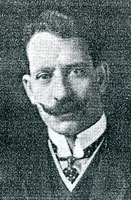
In Newcastle, the media applauded Beecham for resuscitating forgotten works and for introducing others not previously heard; here both were new. In Hoffmann on 14th November, Alfred Heather (left) sang the poet and Cecil Pearson both Crespel and Schlemil, but to Counterpoint, “Mr. W. R. Morand found his ‘métier’ as the irresponsible, irrepressible Governor, and acted with the greatest abandon.”
“Caroline Hatchard,” reported The Daily Chronicle, “sang with singular purity of voice, while her actions as the automaton were highly approved.” In the Strauss, “It seems almost incredible that even ‘The Waltz King’ could cram so much melody into a single work. It is melody fitting to the character of the story, and much of it is of a haunting kind. On occasion it rises to something more durable and earnest as, to give one instance, the song beginning ‘Sweet Song of Homeland,’ which Miss Hatchard rendered with splendid fire and emotional effect…Kate Anderson, who one thinks is no stranger in Newcastle, sang with much charm, and as Adele, the lady’s maid of equivocal tenderness, showed she had histrionic talent of a high order…”
During the week of 21st November in Leeds, “…the Automaton, Miss Caroline Hatchard was excellent, and her mechanical aria was admirably sung, though an encore made it rather tiresome. Her make-up and by-play were well-developed”…
In Nottingham, The Guardian found Caroline “whom audiences have frequently heard with enjoyment, charming as the doll Olympia”… and a tall and stately Gladys Ancrum sang pleasantly as the vivified picture of Antonia’s Mother. The bass w/as also singled out, “Mr. Charles Magrath, which we had become used to associating with rather stodgy parts like that of the King in Lohengrin, showed us that he has a decided talent for parts with a brisker movement. He skillfully kept his Coppelius in Act V plump on the borderline between one of seriousness, and was an uncanny figure as Dr. Mirakel in Act III.”
In Birmingham at Prince of Wales Theatre, “Mr. Wilson Pembroke – glad, no doubt, to get away from the wig and tights of early Wagner – was an excellent Eisenstein, with a quietly humorous style that was very effective.” And “Miss Hatchard as Rosalinde sang brilliantly, and was very resourceful in her change of styles in the three acts.”
To complete their first segment, Quinlan’s merry band arrived at the Theatre Royal in Brighton. To The Herald, Caroline was a joy. “Notwithstanding the immobile expression that is forced upon her, Miss Hatchard makes an extremely pretty doll, and through the hamperings of her fixed stare and mechanical movements she contrives to convey her sense of comedy with singular success. She has, moreover, one of those pliant, flexible voices that are exactly suited to the execution of the florid music that is allotted to the automatum, and she masters to perfection the effective little device of letting her voice ‘run down’ as she periodically collapses into the arms of the solicitous assistant. Miss Hatchard’s long sustained performance is an admirable exhibition, alike of vocalization and comedy, and presently when the time came for her to receive the prolonged plaudits of the audience, she showed how extremely graceful and winsome she can be when she is able to cast off the expressionless rigidities of the doll.”
“And Madame Von Eisenstein, plump, pretty, and singing admirably in the person of Miss Caroline Hatchard, has lively passages with her faithless husband, and makes herself quite the belle of the ball…What the dancers do in movement (dancing the Czardas), so does Madame Von Eisenstein in song, and with rhythmic swaying of body, with action symbolic of the stress of changing emotion expressed in the music, she bursts into wild, untamed song, swiftly alternating crooning melancholy with rapturous abandon, with barbaric, unformed rhythms and pealing head-notes, reiterated and prolonged. Miss Hatchard has sung this trying composition with tremendous energy and abandon, and the audiences have insisted on an encore. The singer has bravely responded; but few people would like to go through such an ordeal twice in one night.”
With this uplifting effort, the Company stood down for Christmas and Caroline seems to have ended her involvement. This is not certain, however, as nine of fourteen libraries in cities visited during the second segment did not reply.
After a two week respite, a mixture of familiar faces and newcomers congregated at the Grand Theatre in Swansea on 2nd January. Bardsley was back, hailed by Quinlan, “as one of his luckiest and most profitable finds. In voluptuous love, in rousing tavern ballad, in comedy and in tragedy, he was magnificent.” Samuell too, as a native of this city, was in his glory as his usual Dapertutto and subsequently as both Crespel and Dr. Mirakel. Caroline’s replacement, Miss Bridget Shannon, “was extremely clever as Olympia…her singing was delightful” – pleasant enough and effective but never rising to Miss Hatchard’s lofty level.
The Cambria Daily Leader chose on 3rd January to praise the organizer: “the son of the St. Helen’s manufacturer is a strange figure in an artistic London. All around him are men engaged in the eternal race, contriving, fighting for wealth, selling genius and cleverness for it, compounding with the world for its price. That is, of course, quite right, but think of this music-possessed man coming into the market with his great ideas and his tremendous ideals, burning with the mission of conquering philistine, material London! Think of Mr. Beecham, sweeping aside the vexatious details that narrow the grandeur of the producer’s dream, refusing to be disheartened by the little things, the trivial considerations and money matters surely are just these to him that limit the outlook of other conductors.
Think of this modern apostle of music setting out upon the quixotic task of conquering fashionable London, and bringing it to a realization of the beautiful in art! Out to lose money if only he can affect his purpose! Is it not heroic?” To which, Beecham might have quipped, “Get an elephant to stand on one foot on the top of the Nelson Column and you will draw a much larger crowd than twenty-five Salomes.” Now was he simply bemoaning the dearth of paying customers? Not at all, he was really at work baiting prospective ones!
Understandably, “local interest centred around Samuell…It is offering no empty compliment to say that Mr. Samuell more than justified the promise of three years ago, when he left Swansea to take up his studies in earnest. He sang the immensely difficult song, ‘As Jewels Divine,’ with dramatic effect, and his stage appearance was most favourable. Mr. Samuell has before him a great future, and his progress will be watched with increasing interest by his friends.”
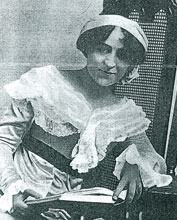
Moving on to The Theatre Royal in Bournemouth on 16th January, attention was focussed upon Miss Freeman (right), her “pathetic picture of the consumptive singer was simply a tour de force. The lady’s flexible soprano voice conveyed every inflection of the music with faultless precision, and her appearance, with fair, waxen cheeks, and shadowed eyes, was too tragically pathetic for words. She simply realized the very soul of Offenbach’s Antonia.”
With Hoffmann now the only show, Seth Hughes joined Bardsley and Heather to share the poet’s role, while Fred Le Maistre also came on board as Spalanzani. On 6th February in Leicester’s Opera House, the Company fared badly competing all week with Nellie Melba who sang at Temperance Hall. But in Wolverhampton, the audience had a feast as…”the orchestra, under Mr. Howard Carr, drew the plaudits of the house, and the ‘Barcarolle’ was encored.”
After a week in Hull and a return visit to Manchester, they arrived at the Lyceum Theatre in Sheffield where on 10 March, unheralded, Beecham arrived in time to conduct Hoffmann. Courtenay and company held forth on 21st March at the New Theatre in Cardiff where endless hurrahs resounded for local hero Samuell, “…the intensely dramatic interpretation of the magician Dapertutto … as a picture of medieval malignity, it has surely never been surpassed.”
And so it went…personnel changed as singers tired or left to fill other engagements. The South Wales Echo welcomed new blood, “Last night Mr. Alfred Heather and Miss Kathleen Maureen were the two principals to appear in each Tale, and their work throughout was as delightful as it was arduous. Mr. Heather’s beautiful tenor voice we have before had opportunities of admiring, and it seems to have broadened. The purity was as pronounced as ever, the breadth of tone was greater, and the robustness seems to have increased; whilst his acting was excellent.” Vera Courtenay was a Carmen-like representative in Tale II and Bettina Freeman a brilliant exponent of ‘Antonia’ in Tale III…
At Plymouth the following week, time was running out. Marie Manette now sang Nicklausse, Gladys Ancrum became a sultry Giulietta while S. Suravitch, Hermann earlier, now assumed the meatier role of Crespel.
And so, early in April in Portsmouth, the laughter, the excitement, the thunderous applause, all came to an end.
The Beecham Opera Comique Tour, 1910/1911
1910
Sept. 5 Her Majesty’s Opera House, Blackpool
Sept. 12 Grand Opera House, Belfast
Sept. 19 Theatre Royal, Dublin
Sept. 26/Oct. 3 Kennington Theatre, London SE
Oct. 10 Theatre Royal, Manchester
Oct. 17/24 King’s Theatre, Glasgow
Oct. 31 Lyceum Theatre, Edinburgh
Nov. 7 Royal Court Theatre, Liverpool
Nov. 14 Theatre Royal, Newcastle upon Tyne
Nov. 21 Grand Theatre, Leeds
Nov. 28 Theatre Royal, Nottingham
Dec. 5 Prince of Wales Theatre, Birmingham
Dec. 12 Theatre Royal, Brighton
1911
Jan. 2 Grand Theatre, Swansea
Jan. 9 Grand Theatre, Fulham
Jan. 16 Theatre Royal, Bournemouth
Jan. 23 Gaiety Theatre, Dublin
Jan. 30 Grand Theatre, Southampton
Feb. 6 Opera House, Leicester
Feb. 13 Grand Theatre, Wolverhampton
Feb. 20 Grand Theatre, Hull
Feb. 27 Princes Theatre, Manchester
Mar. 6 Lyceum Theatre, Sheffield
Mar. 13 Princes Theatre, Bristol
Mar. 20 New Theatre, Cardiff
Mar. 27 Theatre Royal, Plymouth
Apr. 3 Theatre Royal, Portsmouth
On Disc Or Not
About one third of the principals made records and this activity is outlined here, supported by further biographical data to enlarge perception of the main participants whether they recorded or not.
Caroline Gertrude Hatchard was born in Portsmouth, England on 12 October, 1883. After studies at the Royal Academy of Music in London, she made her debut at Covent Garden on 2 May 1907 as Dew Fairy in Hansel un Gretel. (For a more complete history, see The Record Collector Vol.46, No. 2 June 2001). She loathed recording but she was prevailed upon to make 38 discs:
Pathe Freres, June, 1909
1. I wish I was a tiny bird (Lohr) 843 78531
2. A bowl of roses (Coningsby-Clarke) 843 78532
3. The Arcadians (Monckton & Talbot): The Pipes of Pan
844 78534 204006
4. The Arcadians: Light is my Heart 844 78535
5. A Birthday Song (Coningsby-Clarke) 5003 78533
6. Goodbye (Tosti) 5003 78536
7. Patience GIlbert & Sullivan): Love is a plaintive song
220 79067 July 1911
8. Pirates of Penzance (Gilbert & Sullivan);
Poor Wand’ring One 220 79068 July 1911
9. Orpheus with his lute (Sullivan) 681 79069 Dec 1911
10. The Mikado (Gilbert & Sullivan): The Sun whose rays
681 79070 Dec. 1911
The Gramophone Company Ltd, London 27 July 1910
Recorded in Gramophone Company Studios, Thomas Beecham, conductor
11. Les Contes d’Hoffmann (Offenbach): The Doll Song
12 to 24 – not issued
HMV, Hayes 26/28 November, 1911
25. The beautiful land of Nod (Liza Lehmann)
HMV ab14555e 3902
26 to 29 – not issued
Aeolian-Vocalion with Aeolian Orchestra
30. Lucia di Lammermoor (Donizetti): Il dolce suono
01242 A-0107 C-01057 21 Jan. 1921
31. Se saran Rose (Arditi) 01296 A-0108 C-01058 21 Jan. 1921
32. L’Allegro ed il Pensiero (Handel): Sweet bird
01871 a-0116 C-01063 Jan. 1921
33. Lakme (Delibes): Ou va la jeune Hindoue?
01869 A-0121 C-01066 Feb. 1921
34. Ernani (Verdi): Ernani, involami 01575 A-0145 C-01068 1921
35.The Creation (Haydn): With verdure clad
01573 A-0154 C-01072 Sept. 1921
36. Mignon(Thomas): Je suis Titania
01226 A-0172 C-01077 Feb. 1922
37. Tom Jones (German): The Waltz Song
01484 C-01086 JO4111 Dec. 1922
38. Dinorah (Meyerbeer): Ombra leggiera
01629 C-01098 JO 4111 Dec 1923
John Bardsley was born on 10th June, 1883 in Fainsworth, Lancashire. At the Academy he paid for his studies with Dr. Lierhammer through back-breaking labour in the building trade. After debuting at a Chappell Ballad Concert in Queen’s Hall on 9th March, 1907, he was heard in Bechstein Hall, Albert Hall and in the provinces. His “season in the sun,” so to speak, came with Beecham in 1910, when he portrayed the three servants in The Tales of Hoffmann, then Hoffmann himself, Pedrillo in Il Seraglio, Herr Vogelsang in Mozart’s Impresario and Schmidt in Werther. He collapsed and died on stage on 6th April, 1916, probably the victim of a heart attack or stroke. During his brief time, he was an active recording artist as these few titles attest:
Columbia:
Nirvana (Adams) A5131
Thora (Adams) A5131
Zonophone:
The death of Nelson A33
The Sailor’s grave (Sullivan) A33
HMV:
Ailsa Mine (Newton) 130035/Twin A38
I seek for thee in every flower (Ganz) 130035
Regal:
I’ll sing thee songs of Araby G 6261 Jan-Feb 1909
Homophone:
The garden of my heart (Ball) 60244
My dear (Ball) 60244
The vacant chair (Hart) 60349
The singer was Irish (Francis) with Annie Bartle 60349
Pathé Vertically-cut
The maid of Manaar (Coverley) US 35105/A.79765
I loved you more than I knew (Ketelby) US 35105/A.79766
Others:
Only to see her face again 546
Macushla 546
Thora 140
Roses (Adams) 140
Second only to Caroline in popularity, William J. Samuell was born in Wales in 1885 and, so filled with promise, he too died in 1916, a victim of typhoid. Fortunately, HMV was able to entice him to record a few gems in 1915/1916:
Tales of Hoffmann (Offenbach): Mirror Song
02614,Ho.1221.ac
Romeo et Juliette (Gounod): Queen Mab 02631,Ho.1220.ac
Hérodiade (Massenet): Vision fugitive
Gram. 2-032109, Ho.1036.ac; CD: Record Collector TRC8
Rigoletto (Verdi): Dear child with Nora D’Argel
04140,Ho.1154.ac
Rigoletto (Verdi): Gilda, Gilda, my daughter
with D’Argel 04144,Ho.1154.ac
Merrie England (German): The Yeomen of England 4-2695, E81
There’s a hill by the sea (Lohr) 4-2633,Ho.1802.ab
Sincerity (Clarke) with D’Argel 04139,Ho.1150.ac
Friendship (Marzials) with D’Argel 2-4337, E104
Go pretty Rose (Marzials) 04158
The wanderer’s song (Harrison) 4-2671
Soprano Edith Evans, born in Bristol in 1880 of Welsh parents, began singing professionally at the age of sixteen. In the autumn of 1907, Hans Richter heard her in Bradford and wrote to Pitt, “She has such enthusiasm in her really big voice…and has expressive eyes.” So, she appeared as Gutrune in Twilight of the Gods when the English Ring was given at Covent Garden early in 1908 and for the second run in January, 1909, she sang Freia in The Rhinegold and Ortlinde in The Valkyrie. For Beecham’s 1910 season at the Garden, she sang Rowena in Sullivan’s Ivanhoe and Avice in Smyth’s The Wreckers. Then, for his Opera-Comique company, she sang Nora in Shamus O’Brien, as Ursula, then Diemut in Feuersnot and Giulietta in Hoffmann. She toured until just before Christmas when TB extracted her to sing at the Garden. She also sang with the Liverpool Choral Union on 21 January, 1911 in Handel’s Acis and Galatea with Robert Radford and Cynlais Gibbs, and in that city on 18 November in Elgar’s Scenes from King Olaf with David Brazell and Lloyd Chandos. Thereafter she cast her lot with Quinlan, then with the Harrison Frewin Company, with whom she sang Santuzza in Cavalleria Rusticana. Concert and festival activity took her to her moment of death from influenza in January 1919. This most promising soprano, who participated in Beecham’s first records in 1910, made the following on her own in 1916:
Prince Charming (Liza Lehmann) HMV 03490, Ho.16 57
Il Trovatore: Breeze in the night HMV 03508, Ho.1993.af
Ivanhoe (Sullivan): Lord of our chosen race HMV 03515
CD: Symposium: 1123
The Reason (Del Riego) HMV 03548
Boston-born (1889), Bettina Freeman started her career with that city’s opera company in 1909 as a mezzo soprano and made all but one of her records as a mezzo. After re-studying as a dramatic soprano, she began an extensive career in England. In the autumn of 1913, she joined the spectacular tour organized by Ernst Denhof. Thus, she came to Birmingham on 19 September as the first to sing Mélisande in English with Walter Hyde as Pelléas. From 1 November to 13 December, she was with Raymond Roze for his English Opera Season as one of four to portray Joan of Arc, Roze’s own “masterwork” through twenty performances. She survived to sing real opera as Elisabeth in Tannhäuser with John Coates. In July/August 1915, Bettina Freeman checked in at the Ravinia Festival, summer home of opera for Chicagoans in 1915, to appear as Aida, Cio-Cio-San, Giuiletta, Tosca, Leonora in Il Trovatore, Santuzza, Elsa and Thais. They were usually two hour programmes so long operas were reduced to scenes. She remained active until the late 1920s.
4451 The Little Irish Girl (Lohr) (A856)
4452 A Little Thief (Stern) (A856)
30387 Addio (Tosti) (A5225)
30388 Marriage of Figaro: Voi che sapete (A5214)
30393 Les Huguenots: Lieti Signori (A5215)
30394 L’Ardita Waltz (Arditi) (A5213)
30395 Carmena Waltz (Wilson) (A5213)
30398 Faust: Le parlate d’amour (A5214)
30399 Il Trovatore: Stride la vampa (A5215)
30475 Mignon Connais-tu le pays? (H1056)
30476 The Bohemian Girl: I dreamt I dwelt (A5335)
30422 Rigoletto: Quartet with Eugenia Bronskaja,
Florencio Constantino and Ramon Blanchart (A5177)
30443 Lucia: Sextet with Bronskaja, Constantino, Blanchart,
Jose Mardones, Cilla (A5177)
30460 Lakme: Sous le dome with Bronskaja (A5186)
Born in Canada in the 1880s, Beatrice La Palme studied for five years on a Strathcona Scholarship at the Royal College of Music, first the violin, and then as a singer. Eventually she abandoned her first love, despite having earned an ARCM in violin and harmony. She made her operatic debut at Covent Garden as Musetta in La Bohème with Melba no less as Mimi. In France, she spent a year at the Lyons Opera and two at the Opera-Comique in Paris. She caught Beecham’s eye and for his summer season, she sang in Hoffmann and Figaro. On tour she was Antonia in Hoffmann and Adele in Fledermaus until Beecham called her away on 3 October as he needed her Antonia in London as well as roles in Fidelio, Hansel and Gretel, Nozze di Figaro, Carmen and Clutsam’s A Summer Night. After recitals at Aeolian Hall and elsewhere, she returned to Canada in 1913 for more of the same in Montreal, Toronto, Ottawa and at the Century Opera House in New York. She too was busy in 1914 and 1915 at the Ravinia Festival. She was married to Sig. Sal Issaurel.
Records
None?
Another Bristol girl, soprano Kate Anderson, went to the Royal College of Music at age sixteen to study the violin. She too chose to switch to singing and study with Albert Visetti. Still a student in 1901, she sang at the Garden in Stanford’s Much Ado About Nothing. During 1903-1904 at Albert Hall she sang with leading choral societies and appeared as Micaela in Carmen first with Moody-Manners in 1904. With this company, she toured England, singing a variety of roles. In Newcastle during Beecham’s tour, “her demure, but ambitious Adele, the maid, was an emphatic success in all situations.” Again, no records are known.
Born in 1876, tenor Alfred Heather studied singing with T. A. Wallworth, Alessandro Romilly and Sir Charles Santley. At the beginning of his career, he devoted himself to serving the Church as a tenor soloist at St. Annes’s, Soho, and subsequently at the Chapel Royal, Hampton Court Palace. Making the transition to the stage, he sang in light opera and toured the country for two years. During the Boer War, he entertained in South Africa, playing a variety of parts and acting as stage manager for his company. After the siege of Ladysmith was lifted, he was first to give a concert. Lured back to England, he sang for Beecham in London and on tour, his specialty being comic roles, such as Pedrillo in Mozart’s Il Seraglio. In the process he became a close personal friend and favourite tenor of bass Robert Radford. In 1920, Heather decided to take a leading role in a revival of The Beggar’s Opera at the Lyric Theatre in Hammersmith. When the company took the opera abroad to Toronto in 1921, Heather went along and stayed. He remained for the rest of his days, participating fully in the city’s musical activities until his death in 1932. He left many records.
Pathé Etched-label discs, recorded in London, 1906:
The Gondoliers (Gilbert & Sullivan):
Take a pair of sparkling eyes 60538
I’ll sing thee songs of Araby 60539
The Rose of Persia (Sullivan): Drinking Song 60540
The anchor’s weighed (Braham) 60541
Mary (Richardson) 60542
The Lily of Killarney (Benedict): The moon hath raised
her lamp with Bantock Pierpoint 60544
Excelsior (Balfe) with Pierpoint 60545
Faust (Gounod): Be mine the delight with Pierpoint 60546
Larboard Watch (Williams) with Pierpoint 60547
The two beggars (Wilson) with Pierpoint 60549
Friendship (Marzails) with Pierpoint 60551
Faust (Gounod): Then leave her w. Pierpoint and Evans 60564
Bonnie wee thing (Horrochs) 60597
The Bohemian Girl (Balfe): When other lips 60598
Come into the garden, Maude (Balfe) 60599
The Bay of Biscay (Davy) 60620
Alice, Where art Thou? (Asher) 60621
Believe me, if all these endearing young charms (Moore)
60622
Pathé 1907:
Sing me to sleep (Greene) 77008
Love’s old sweet song (Molloy) 77009
The sailor’s grave (Sullivan) 77010
Maritana (Wallace): Yes, Let me like a soldier fall 77011
For all Eternity (Mascheroni) 77012
The Holy City (Adams) 77013
Sally in our alley (Cary) 77014
The last watch (Pinsuti) 77015
Army and navy (Cooke) with Pierpoint 77016
Tenor and baritone (Wilson) with Pierpoint 77017
The Fisherman with Pierpoint 77018
To Mary (White) 77029
My sweetheart when a boy (Morgan) with chorus 77030
The Star of Bethlehem (Adams) 77031
Judas Maccabaeus (Handel): Sound an alarm 77032
The Battle Eve (Bonheur) with Pierpoint 77033
Albion, On thy fertile plains (Braham) with Pierpoint 77034
Tell Her I love her so (de Faye) with Pierpoint 77035
Saint Paul (Mendelssohn): Be Thou Faithful 77087
Nearer My God to Thee (Mason) 77096
Pilgrims of the Night (Liddle) 77097
Dorothy (Cellier): Queen of my Heart 77098
Dorothy (Cellier): With such a dainty Dame 77099
Pathé 1907-08:
Queen of Sheba (Gounod): Lend me your aid 77119
Jephtha (Handel): Waft her, Angels 77120
Elijah (Mendelssohn): If with all your hearts 77121
Rock of Ages (Redhead) 77126
God be with you (Emblad) 77127
Beloved, It is morn (Aylward) 77128
Safe in the Arms of Jesus with Westminster Choir 77521
The Mikado (Gilbert & Sullivan):
A wandering minstrel I 77524
Pathé 1910-11
I knew (d’Hardelot) 70438
Two eyes of gray (McGeogh) 78439
Roses (Adams) 78440
A memory (Park) 78441
Once again (Sullivan) 78442
Only once more (Moir) 78443
Gramophone Company 10 inch double-sided records
The Beggar’s Opera: Fill every glass D525
The Beggar’s Opera: Let us take the road D525
Bonnie wee thing HMV 120093
Sound the Pibroch HMV 120093
It isna’ Jean HMV 120108
Mary Morrison HMV 120108
In August, 1906, tenor Wilson Pembroke sang Faust with Fanny Moody and Charles Manners and company. He stayed active in opera but on 8 January, 1910, appeared as Obadiah in a dramatized Elijah with Graham Marr as the Prophet. Entering Beecham’s world for the 1910 summer season, he was Bailiff in Strauss’s Feuersnot. On tour, he spelled off Bardsley as Eisenstein but when The Bat folded its wings, he was free to join Ernst Denhof for three weeks of touring Wagner’s Ring in English, singing Froh in The Rhinegold in Leeds (28 March), in Manchester (3 April), and in Glasgow (11 April). He was heard in concerts but seems to have faded swiftly afterwards. He left at least three records:
Take a pair of sparkling eyes (Sullivan) Winner 2016
Nirvana (Adams) Winner 2017
My sweetheart as a boy Winner 2464
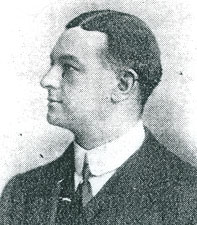
Bass-baritone Frederick Ranalow (pictured) was born on 7th November, 1873 in Kingstown, Ireland. When he discovered his voice, he went to London and the Royal Academy of Music to study under Arthur Oswald and Alberto Randegger. He sang throughout the country until Beecham appeared. Quickly he was TB’s leading baritone, a much admired Hans Sachs, Figaro and Papageno. On tour his assignments were Crespel in Hoffmann and Dr. Falke in The Bat. On Boxing Night 1917 in Birmingham, he was reunited in Messiah with Edith Evans and Alf Heather. Early in the 1920s, Fred took the lead in The Beggar’s Opera and proceeded to perform it over 1400 times. In the thirties, he was drawn into motion pictures, one fine film being “Autumn Crocus.” He died in 1953, leaving a decent recorded legacy:
The Boatswain’s Mate (Ethel Smyth) HMV Album of excerpts with Rosina Buckman,Courtice Pounds; cond. the composer. HMV 02697, 2-0696/7, 04183/4/5, 03527 (1916)
The Beggar’s Opera (Gay-Pepusch) FR as Macheath with Sylvia Nelis, Nellie Walker, Frederic Austin, Violet Marquesita, Nonny Lock, Arthur Wynn, cond. F. Austin with Lyric Theatre, Hammersmith HMV D254-6, c. 1922 Excerpts HLM 7009
H.M.S. Pinafore a near complete recording by HMV in 1922.
Madama Butterfly (Puccini) FR as Sharpless with Rosina Buckman, Tudor Davies, Sydney Coltham; cond. Eugene Goossens, Claremont LPs SY2-501 (1924)
Faust (Gounod): Serenade 1149
Faust (Gounod): Duel Trio with Frederick Blamey,
Frederic Austin Col. D1336, 35956 rec 1916
Faust (Gounod): Prison Scene from Act 5. Trio with Rosina
Buckman and Maurice d’Oisly L-1025 6683-2 rec pre 3-1916
Tannhäuser (Wagner): O star of eve 1149
Maritana (Wallace): Turn on, old time with Edith Clegg,
Maurice d’Oisly Col. D.1336, 35950 (1916)
The Sorcerer (Gilbert & Sullivan): The Vicar’s Song
Winner 2414
Sincerity (Clark) Winner 2267 (1913)
Glorious Devon Winner 2361
Five and twenty sailormen Winner 2414
The old gray fox (White) Vocalion R-6059 (c.1922)
Maire, my girl (Aitken) Vocalion R-6059 (c.1922)
The floral dance (Moss) Piccadilly 5010 (1930)
The lute player (Allitsen) Piccadilly 5010 (1930
Faust (Gounod): Serenade Piccadilly 5044 (1930)
Tannhäuser (Wagner): O star of eve Picca 5044 (1930)
Principal bass Charles Magrath was born in 1865 in Cork, Ireland. After initial studies locally, he advanced to the Royal College of Music in London, eventually appearing in The Baroness, a light opera by Cotsford Dick at the Royalty Theatre, London. That opened up opportunities to sing in London and environs, before he left for Australia and the colonies in 1894. Back in England, he appeared in Shamus O’Brien and in The Greek Slave. He became a stalwart in grand opera all over England, especially in Wagner. He still drew fine notices when he sang first with Beecham and then with Quinlan on his tours. When he died is a mystery, and apparently this much esteemed bass left no records.
Not to be forgotten is Ruby Gray, her Nicklausse in Hoffmann being “a deliciously piquant study”, while she delivered a steadfast Prince Orlofsky. Miss Gray had a reputation of excellence in Iolanthe, The Gondoliers, My Mimosa Maid, Fallen Fairies and other pieces of like ilk at the Savoy Theatre and elsewhere. She too did not record.
Seth Hughes was well suited to romantic roles for he had sung Pinkerton, Don Jose and Turiddu with Moody-Manners. On tour in Bournemouth, “his Hoffmann was a consistent and thorough rendering of the part. Dramatically, it was charming. Vocally his work was careful and pleasing, except for occasional falsetto notes. Mr. Hughes had a most enthusiastic reception from the audience.” He is heard with baritone Lewys James in the duet from Il Trovatore “Thou bringst, eventful hour” on Pathé 78338, 47114 (ca 1908). And look for duets from Faust and La Bohème they also recorded.
Soprano Gladys Ancrum, born in Norbiton, Surrey, England (date unknown), studied at the Guildhall School of Music, with Jean de Reszke in Paris, and then George Otley in London. On tour, she was under-utilized as Antonia’s Mother in Hoffmann and Adele’s sister in The Bat, but near the end she was raised to Giulietta. She shared Quinlan’s adventures abroad from 1912 to 1914, venturing to South Africa and Australia. Coming home, they crossed Canada, pausing in Winnipeg to sing Venus in Tannhäuser and Irma in Louise. She performed in 1919/1920 for Beecham at the Garden and in 1924 with the British National Opera. This statuesque and greatly admired singer can be heard briefly as Brünnhilde in Wotan’s Sentence from Valkyrie with Robert Radford as Wotan, recorded on 25 May, 1924. She also appeared in the Columbia set of Daughter of Madame Angot, recorded in 1921.
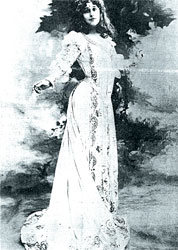
Billed as “one of the most talented artists”, Vera Courtenay (pictured) joined the tour during the final phase “with considerable operatic experience. She had played all the principal soprano roles at the Opera-Comique in Paris, the Metropolitan, New York, and was leading soprano in a French Opera Company that visited South America in 1909.” Actually, she sang during the 1909-1910 season at the Metropolitan but only as a participant in five concerts. Records ?
The undisputed star was Caroline Hatchard. She established herself so firmly in the hearts of provincial music-lovers that she returned time and again. Ewen Langford, her son, explains, “She needed the money. Don’t forget she started a family in 1915 and bought a new house in an up and coming suburb. So, the North of England with its choral traditions and lots of ‘brass’ beckoned. Her introduction to all this was the tour of 1910.” Thus Londoners rarely heard her nor did anyone beyond British shores. That explains why this exceptional singer suffers from neglect. And yet, as l listen to a fine CD provided by Ewen, I am saddened to know so few can enjoy this very special experience.
It is Beecham who is remembered, and rightly so, for his genius conceived this venture and his beneficence made it possible. A vast musical achievement it was!
Acknowledgements
I am indebted to Derek Johnston in Bradford who undertook to contact librarians in each city visited, and to the sixteen librarians who responded. I am also grateful to Dennis Foreman in Nottingham for information and to Tony Benson for the Tour Chart. Also thanks to Graham Oakes in Wales for biographical detail from his much-anticipated, still-to-be completed book about English singers and John Davies also in Wales for other data. I appreciate too the discography assistance from Dennis Foreman in Nottingham, the late Ronald Taylor of New Barnet, Herts and Barry Badham of Pymble, Australia.
Sources
“Roll Back The Years” by Edward B. Moogk, published by the National Library of Canada, 1975.
“American Celebrity Recordings 1900-1925” by Julian Morton Moses, published by Monarch Record Enterprises, Dallas, Texas.
“Sir Thomas Beecham Bart. C.H. A Calendar of his Concert and Theatrical Performances” by Maurice Parker published in 1985
and Supplement to same by Tony Benson published in 1998.
Published in Le Grand Baton, January, 2005


















